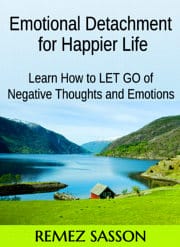
- Are you quick to get angry?
- Do your moods go up and down often?
- Are you easily affected by what people say or think about you?
- Can an insignificant incident destroy your whole day?
- Do you allow situations and people to affect your moods and behavior?
- Do you lack inner peace?
Imagine how free, relieved, and happy you would be if you could stay calm and poised in the midst of whatever is happening in your life.
Think how much physical, emotional, and mental energy you could spare if you were able to avoid becoming upset, angry, or moody.
Emotional agitation, anger, and hurt feelings create stress and unhappiness and lead nowhere except to more pain, suffering, and broken relationships. They disturb your mind, disrupt your concentration, and prevent you from focusing on the matters at hand.
Browse our online courses on meditation, positive thinking, overcoming procrastination, confidence, and freedom from distractions.
If you wish to enjoy inner peace, it is I highly recommend that you try to gain at least some degree of emotional detachment.
What too Much Emotional Involvement Does
- Too much emotional involvement with matters that do not concern you or that are not important takes too much of your time, energy, and health.
- Excessive emotional involvement agitates your mind and feelings and prevents you from experiencing inner peace.
- Too much emotional involvement leads to attachment, to fear of letting go, and to avoiding changes.
If you wish progress in life, you need at least some degree of emotional detachment, otherwise, you let people and events, your thoughts and your past, tie you down.
Detachment is important in daily life, in the pursuit of ambitions, and on the spiritual path. It is valuable to everyone, whether pursuing spirituality or material success.
Examples of Detachment
Here are two examples of emotional detachment.
1) What happens, when somebody says to you something that you don’t like?
You will probably become angry, unhappy or feel hurt.
Why is this so? Because you value other people’s words and opinions more than you value your own thoughts and opinion of yourself. You let other’s people thoughts, words and actions influence your happiness, actions and reactions.
On the other hand, when you possess emotional detachment, you enjoy a state of inner peace and equanimity, unaffected by circumstances, or by other people’s moods and states of mind. You learn how to let go, and that’s a great achievement.
2) You sit down to meditate, but thoughts keep coming into your mind. You get emotionally involved with your thoughts, follow them, and forget about your meditation.
If you could display some detachment, it would have been easier to ignore the disturbing thoughts. Detachment would have helped you stay collected and concentrated.
Learn About Our Online Meditation Course
Various meditation techniques for finding inner peace, expanding consciousness, and awakening.
Emotional Detachment Is a Skill You Can Learn
You need this skill if you wish to become free from worries, fears and anxiety. You will find it useful in many situations, when dealing with family or friends, at your job, in stressful situations, and when pursuing goals.
- This skill can help you stay focused and use common sense in the daily affairs of your life.
- It will help learn how not to let people bother you.
- It will help learn how to not let people affect you.
- You will be able to prevent the behavior of others destroy your inner peace.
I am not talking about physical detachment and avoiding people. Detachment, in the sense referred here, is an inner attitude of composure and equanimity, when you do not take things personally, and do not allow other people’s emotions, thoughts or actions to affect your state of mind and your judgement.
Emotional detachment would not necessarily make your life problems-free. You will still encounter disturbing circumstances and disturbing people, because this is part of life. However, your attitude toward them, your state of mind, and the way you react, would change.
Browse our online courses on meditation, positive thinking, overcoming procrastination, motivation, confidence, and freedom from distractions.


